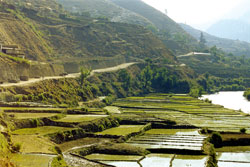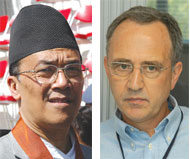Donors divided
As the conflict shows signs of nearing a climax in the coming month, Nepal's major donors are embroiled in a row among themselves and with the government over new aid that could be seen as support for an autocratic regime.
Most bilateral donors have frozen aid since the king's February coup and say they will not add new aid until he restores democracy. They argue the king's move has made it more difficult to find a political solution to the insurgency.
However, multilateral lenders like the World Bank and the Asian Development Bank argue that the Nepali people should not be punished for the king's power grab and say they are mandated to continue supporting infrastructure and development projects. The long-simmering row has now broken out in the open. Meanwhile, the royal regime itself has locked horns with Switzerland and Britain over their new $5 million project to support democracy and human rights. Under pressure from its intelligence services, the government is threatening to scrap the project which it calls a ploy to channel money to opposition political parties. Most aid is frozen, development projects are grinding to a halt, but Nepal's big donors are preoccupied with something much more earth-shattering: squabbling over whether continued development aid lets the royal regime off the hook.
Meanwhile, the royal regime itself has locked horns with Switzerland and Britain over their new $5 million project to support democracy and human rights. Under pressure from its intelligence services, the government is threatening to scrap the project which it calls a ploy to channel money to opposition political parties. Most aid is frozen, development projects are grinding to a halt, but Nepal's big donors are preoccupied with something much more earth-shattering: squabbling over whether continued development aid lets the royal regime off the hook.
After King Gyanendra took over on 1 February 2005, most bilateral donors (representing individual countries) suspended new aid and froze other assistance. They also accused multilateral institutions (like the World Bank and the Asian Development Bank) of being soft on the royal regime by not stopping aid. Budgetary support from multilateral banks, they said, would ultimately fund security expenses.
Since February First, the World Bank has made commitments on two projects worth $35 million and is now set to provide $90 million in grants for higher education and the Poerty Alleviation Fund.
The Asian Development Bank says it made no new commitments in 2005 but approved two loans of $60 million that were committed earlier. Bank officials say two other projects worth $40 million have also been signedbut they were committed earlier.
"Assistance like this shows that these institutions care least about the present situation in Nepal," said a visibly annoyed chief of a bilateral donor agency, "by continuing its assistance programs it is endorsing this regime."
The multilaterals have so far ignored the criticism. But now even they are firing back accusing the bilaterals of double standards and hypocrisy. Bilateral donors have committed $356 million to the government in the last year but they don't want this to be known for political reasons.
"They have asked us to take over some of their projects, but in public they paint us as villains while posing as heroes," one agency official told us privately, "our charter requires us to stick to development, we can't play politics with aid."
A senior Finance Ministry official confirmed that some bilateral donors are asking multilaterals to include them in projects. "They wish to spend their money but they don't want to be seen as helping the government directly," the official confirmed. But the ministry is now involved in a potentially bruising row with the Swiss and the British aid agencies which now want to directly fund political parties in their pro-democracy struggle.
Despite their disagreement, both bilaterals and multilaterals are critical of the palace and want the king to roll back his takeover. The last formal meeting Nepal's donors had was in January 2005. There is no preparation of holding the Nepal Development Forum, the annual meeting of the consortium of donors. State Minister for Finance Roop Jyoti is meeting donors for the first time on 6 March, three months since he was appointed.
"This is becoming a real problem for the development sector," said a senior diplomat with one of Nepal's biggest bilateral donors.
To be sure, the government did feel an easing of pressure when multilaterals resumed aid in the middle of last year but the regime shot itself in the foot with its controversial guidelines for NGOs. And when the government failed to respond to the unilateral Maoist ceasefire in September and announced municipal elections, relations with bilateral donors soured further. The last straw was the arrest of political leaders last month which was slammed by even a restrained bilateral donor like Japan.
"We have been instructed to closely monitor the situation to decide on our future assistance plan for Nepal," Koji Tomita, First Secretary at the Japanese Embassy, told us.
The government's last line of defence is to invoke aid in the name of the people, and its argument now is that donors should not punish the people by holding back aid. "We have told the donors that if they discontinue their assistance to Nepal, it will be the people who will suffer," says one senior official, "in that sense they would be no different from the Maoists who are using the people for their cause."
Some multilateral officials in Kathmandu agree, "Even if we oppose the political changes, we don't want the people to suffer and that is why we have not stopped our assistance." Said one.
Where will the money go?
 The royal regime has taken strong exception to a new project being launched by Nepal's two major donors, the UK Department for International Development (DfID) and Swiss Development Cooperation (SDC), which it says could fund political parties.
The royal regime has taken strong exception to a new project being launched by Nepal's two major donors, the UK Department for International Development (DfID) and Swiss Development Cooperation (SDC), which it says could fund political parties. The nearly $5 million Rights, Democracy and Inclusion Fund (RDIF) is designed to support rights groups, NGOs and even government agencies but the government's intelligence services have smelled a rat, saying the money could be channelled to political parties opposed to the royal takeover.
They are now leaning on the Finance Ministry to reject the project outright. The Swiss are said to be firm on not backing down while DfID has held several rounds of discussions with the government to iron things out.
The Finance Ministry says it is unhappy at the way the project was introduced with just one page of guidelines and because its steering committee pointedly excludes government officials.
"DfID is saying it doesn't have the mandate to fund political parties but we need to be assured and we also need to know what is this all about," State Minister for Finance Roop Jyoti (pictured above) told us, "if it is something to help Nepal then the government must have ownership in it especially when there is change in donors' policies."
DfID officials admit there is a problem. "There certainly have been some differences of views on how the fund should be managed," said DfID Nepal chief Mark Mallalieu (pictured above), "but we will end up making a reasonable understanding with the government."
The project is already being implemented and the two donors are seeking proposals for funding from NGOs activists. They say even government agencies are eligible for the money.
But ministry officials say they are being squeezed between the donors and the intelligence services. One ministry source told us: "They tell us that the project aims to pump in money into the opposition parties and they want to scrap the project."
During his walkabout in Patan last September, King Gyanendra had directly instructed district officials to be vigilant about new overseas funds. "Foreign money is being brought in to do different activities that are against national interests," the king had said, warning, "so we believe you will work extra hard to monitor such activities."
DfID's Mallalieu explains that the new fund is aimed at making multiparty democracy sustainable: "Since the king, parties and the Maoists have been stressing on the return to multiparty democracy, we think the fund could play a positive role toward that end."
In this row, Minister Jyoti seems to be angrier with the Swiss who have been less compromising than with the British. "The way SDC has been issuing statements about the fund is totally unacceptable," said Jyoti. An SDC official declined to comment at the present time.


